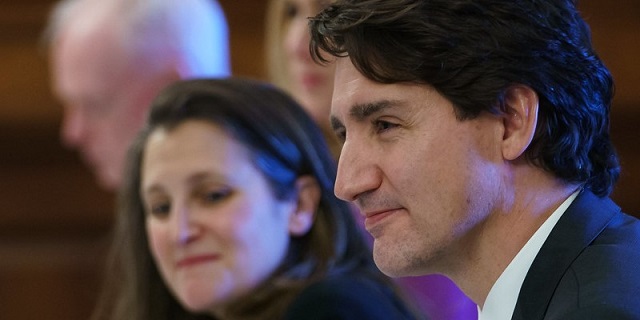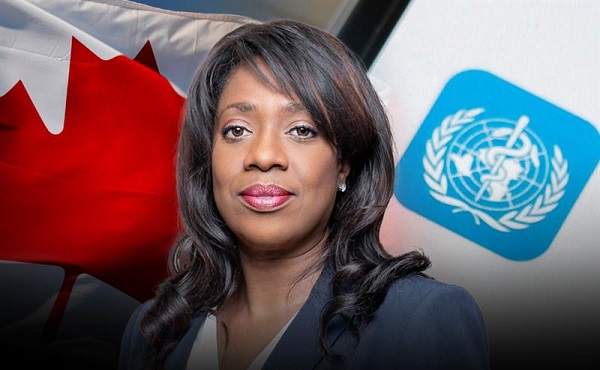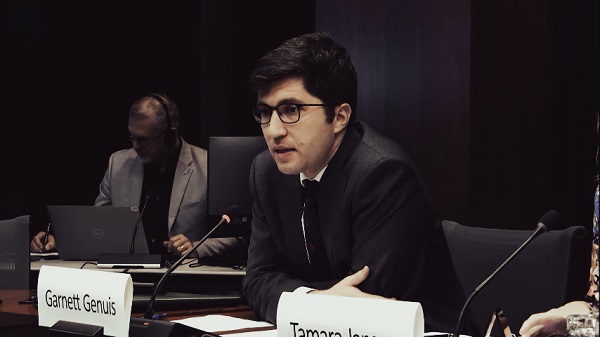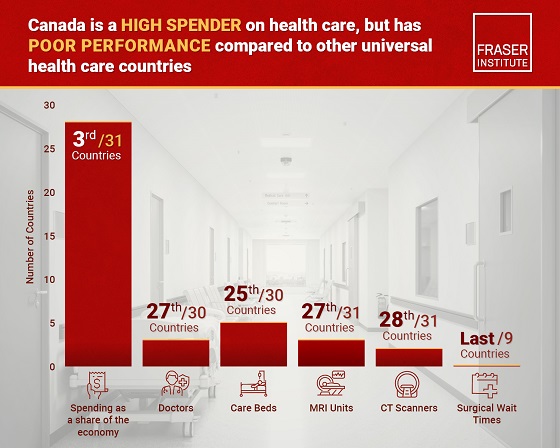National
Federal government’s promises of deficit reduction ring hollow

From the Fraser Institute
” the most credible promises are introduced with immediate action “
As budget season approaches, it’s worth remembering that policymakers must pair promises of fiscal discipline with concrete action.
According to projections, the Trudeau government will run a $40.0 billion deficit this fiscal year, which is slightly larger than last year’s $35.3 billion deficit, even though revenues are up almost $10.0 billion. Finance Minister Chrystia Freeland has repeatedly said that the era of large deficits won’t last forever and promised that starting in 2026/27 the federal deficit will be held every year to less than one per cent of GDP (the value of all goods and services produced in the economy).
But Freeland’s promises should be taken with more than a grain of salt because all governments have spotty track records when it comes to fiscal promises, particularly when they’re based on spending restraint in the future. Conversely, the most credible promises are introduced with immediate action.
The most famous example in Canada’s recent fiscal history came in the 1990s when Paul Martin, the then-Liberal government’s finance minister, vowed to slay Canada’s crippling budget deficit and repair federal finances “come hell or high water.” Martin’s words were accompanied by immediate action in the form of the transformative 1995 federal budget that began a process of deep budget cuts and major policy reforms that immediately put the government on a path to fiscal balance. The deficit was quickly eliminated and Canada was put on a sound fiscal footing that served the country well for almost two decades.
The “hell or high water” episode shows us how governments must match strong commitments with strong actions to increase the likelihood of success. On the other hand, promises for fiscal improvements in the future—unaccompanied by any concurrent action—usually aren’t worth the paper (or Tweets) they’re printed on.
The Trudeau government has produced many examples of incredible promises. First, on the campaign trail back in 2015, Trudeau and his team promised small and temporary deficits, and to shrink the national debt burden. Since then, the prime minister and his finance ministers have never been shy about promising to improve the bottom line. However, the target dates associated with these promises came and went without much notice, and the government pivoted to new plausible-sounding targets, using only words without policy change.
Again, the Trudeau government is far from alone in this tendency. In Ontario, Premier Wynne’s government repeatedly promised to shrink that province’s daunting debt burden, yet failed to decisively act. Basically, it was wishful thinking.
After Ontarians voted out the Wynne government, the Ford government promised to break from the Wynne approach and introduce real reforms that would slay the deficit quickly. But after a few half-hearted feints in the direction of fiscal discipline, the Ford government also failed to make good on its promises of debt reduction and as a result Ontario remains stuck under a mountain of government debt.
Canadian history is clear—unless government promises coincide with concrete actions to immediately start shrinking budget deficits, these promises of fiscal restraint at some future date shouldn’t be given much credence. Minister Freeland’s recent promises fall into this category. In the upcoming federal budget, if the Trudeau government and its cabinet want its promises to be credible, it must learn from its Liberal predecessors and their “hell or high water” moment, and reduce spending to immediately begin a process of deficit reduction.
Authors:
Business
$15B and No Guarantees? Stellantis Deal explained by former Conservative Shadow Minister of Innovation, Science and Technology

Rick Perkins reveals what billions in subsidies didn’t buy: job protections, clawbacks, or Canadian hiring guarantees.
For weeks, Canadians were told, confidently, smugly, that the $15 billion handed to Stellantis and Volkswagen was protected by “job clauses” and “performance-based contracts.” That’s the line Industry Minister Mélanie Joly repeated in interviews, press releases, and on social media. It’s a lie.
Yesterday, we sat down with former Member of Parliament Rick Perkins one of the few people who actually read the unredacted contracts in question and he laid it out plainly: those job guarantees don’t exist. Not in the way you were told. Not even close.
“There is no cancellation clause,” Perkins said.
“The ‘job commitments’ are maximums, not minimums. And the contracts don’t require those jobs to be Canadian or even union.”
Let that sink in.
We were sold a vision of a green industrial renaissance, Canadian workers building Canadian batteries in Canadian factories, funded with Canadian taxpayer money. Instead, we’ve bankrolled foreign-owned companies to build batteries with no guarantee they’ll hire local workers, or that the batteries will even be sold in Canadian vehicles.
And here’s the kicker: the federal government is already writing monthly subsidy cheques, covering 100% of the cost per battery, based on production volume, not sales. That’s right. You and I are footing the bill whether those batteries go into a Dodge Ram, a Chinese-market minivan, or sit on a warehouse shelf until 2032.
No wonder the production subsidy contract is only 26 pages long. There wasn’t much in it.
Minister Joly claimed there are “performance conditions” and “job guarantees.” But as Perkins told us, those words are political wallpaper not legal obligations. There’s no enforcement mechanism. There’s no clawback clause. There’s no language saying, “You must hire X Canadians or repay the money.” It’s not there.
And that’s what this government doesn’t want you to understand. It’s not just that they wasted your money, it’s that they did it knowingly.
They gambled billions on the assumption that Joe Biden would remain in power, that EV mandates would keep growing, and that Trump wouldn’t come back. Now that he has, with tariffs, deregulation, and a clear “America First” energy agenda, these companies are doing what any rational business would do: they’re leaving.
And there’s nothing in the contract stopping them.
If you’re wondering why the mainstream media isn’t shouting this from the rooftops ask yourself who cashes the cheques. Ask yourself why no journalist has demanded to see the full, unredacted documents. Ask why Minister Champagne hasn’t been hauled before a committee and asked under oath whether he even read the damn contract before signing.
We did what they wouldn’t. We got the receipts. We sat down with someone who saw the deal with his own eyes. And here’s what he told us: it’s worse than you think.
The Stellantis deal isn’t a strategic investment, it’s a bailout with no brakes. And every month, billions continue to bleed out of the treasury while ministers issue press releases pretending we’re building an economy.
We’re not. We’re building someone else’s. And we’re paying full price.
This isn’t over.
Invite your friends and earn rewards
If you enjoy The Opposition with Dan Knight , share it with your friends and earn rewards when they subscribe.
Health
Sovereignty at Stake: Why Parliament Must Review Treaties Before They’re Signed

For years I have been closely following the activities of the World Health Organization and Canada’s involvement with the Global Pandemic Treaty.
Thanks for reading! Subscribe for free to receive new posts and support my work.
This treaty, once ratified, will directly influence the public health decisions and responses of all signatory countries.
I have raised red flags about its implications on Canada’s health sovereignty and the federal government’s willingness to enter a legally binding treaty of this weight without any input from Parliament.
In May 2025, after many rounds of negotiations, the World Health Assembly adopted the main text of the treaty. However, it has not yet been signed or ratified – meaning Canada has not yet agreed to be legally bound by the treaty.
We are now in a critical window of opportunity to ask tough questions and debate the treaty before it is signed by the Minister of Foreign Affairs and binds our nation.
What You Can Do
We need your help to get this treaty before Parliament so that your elected Member of Parliament can ask questions and hold the government accountable on Canada’s behalf.
Here’s what you can do:
- Sign this petition that calls on the Prime Minister to allow Parliament the opportunity to review and debate the pandemic treaty before it is signed and ratified.
- Write to your Member of Parliament to ask that they publicly support that same call for parliamentary review.
- Share this post and the petition to drum up the momentum and pressure in Ottawa.
Why This Matters
During the COVID-19 pandemic, we witnessed the WHO’s failures at a global level;. and, nationally, under the expansive claim of the “health and safety of Canadians,” basic civil liberties were suspended broadly and at length. Canadians are rightly concerned that a legally binding agreement could cede too much authority to an unelected and unreliable international organization the next time a pandemic is declared. Meanwhile, five years after COVID-19, the government has yet to show it is serious about improving its pandemic response, with no public inquiry into its actions and decisions during the crisis.
The Background Story of the Global Pandemic Treaty
In December 2021, while the world was still in the grip of the COVID-19 pandemic, the WHO proposed a Pandemic Treaty, known as the Pandemic Prevention, Preparedness and Response Agreement. This would be a legally binding framework that, would seek to prevent and manage future pandemics. Once in force, the treaty would “guide” each country’s response through recommendations to adopt specific measures, such as those related to vaccines, surveillance, data sharing, and travel.
In parallel, the WHO moved to amend the International Health Regulations (IHRs) – the existing legal framework that governs its authority. Over 300 amendments were proposed and later adopted, including a new category called “pandemic emergency” – giving the WHO broader authority to trigger a global response.
Both the treaty and the IHR amendments sparked scrutiny worldwide over the expanded legal powers they could grant the WHO. Many expressed great concern about the level of powers that the WHO would have over national and provincial decision-making during a global public health emergency – concerns that continue with the final treaty text.
Here at home, I launched petitions to call attention to the treaty and its implications – particularly the fact that Parliament had neither debated nor voted on Canada’s participation in a legally binding treaty. I repeatedly urged the government to reject certain amendments or opt out entirely. I wrote to the Minister of Health multiple times to demand answers and transparency.
On May 20, 2025, after three years of negotiations, the World Health Assembly adopted the treaty by consensus. (Notably, the United States did not participate in the negotiations and is not bound by the treaty.)
One key component of the WHO Pandemic Treaty — an annex on sharing pathogens and vaccines — is still being negotiated. Once that section is finished, countries, including Canada, can sign and ratify the agreement.
Canada is currently reviewing domestic laws to make sure they align with the newly adopted IHRs, and plans to table the amended regulations in Parliament this year. The Pandemic Treaty, which is distinct yet negotiated in parallel, will likely be tabled in Parliament only after the annex is complete. Together, the two pieces will form the core of the WHO’s new pandemic response framework.
How You Helped Shape the Final WHO Pandemic Agreement
Early drafts of the WHO Pandemic Agreement included broad provisions on global surveillance, misinformation control, and travel or vaccine measures that raised serious concerns about transparency and national sovereignty.
It was the pushback from concerned and informed citizens like you that forced these changes. Your sustained engagement led negotiators to scale back or remove the most contentious sections.
By the time the final text was adopted in May 2025:
- References to “misinformation” and “infodemic management” were removed entirely, ensuring the WHO has no authority over domestic speech or information controls.
- Clauses that could have enabled travel bans, vaccine mandates, or lockdown coordination were replaced with explicit guarantees of national sovereignty.
- Provisions on surveillance and data sharing were narrowed to voluntary cooperation, with safeguards for privacy and domestic law.
This outcome is a direct result of public vigilance and civil-society advocacy, proving that when citizens engage, international negotiations become more accountable, transparent, and respectful of national democracy.
We Must Insist on Parliamentary Oversight
Many people are unaware that Parliament is not required to debate or approve international treaties before ratification. MPs may request debate, but it is not guaranteed. Canada’s treaty ratification process is governed by policy, rather than law, and remains fully controlled by government (through Cabinet), which can waive or bypass when necessary.
In Canada today, the government — not Parliament — has the final say on signing and ratifying international treaties.
The Minister of Foreign Affairs is supposed to table new treaties in the House of Commons for 21 sitting days so MPs can see them, but this review is only a formality. Parliament can debate the issue or pass laws to make the treaty work inside Canada, but it never votes to approve or reject the treaty itself.
If the government wants to move quickly, it can even skip the 21-day waiting period.
In fact, Canada’s Parliament has never fully reviewed or voted on a treaty before it was ratified — not once in our history. Every other G7 country has a legal process that gives their parliaments that power. Canada is the only one that doesn’t, and as such major international agreements can be signed without real parliamentary oversight or accountability.
A Proposed Law to Review Treaties Before Ratification
There is a private member’s bill before Parliament — Bill C-228 — that aims to make Canada’s treaty process more transparent and accountable. It’s written in the right spirit, recognizing that major international agreements should be reviewed by Parliament before Canada is bound by them.
However, the bill is technically weak and poorly structured, which could make it hard to review the number of international documents that Canada signs each year. Still, it raises an important principle: Canadians deserve strong oversight when their government makes binding commitments abroad.
International cooperation is important, but only Canada’s Parliament should set our national direction. Safeguarding sovereignty and democracy means ensuring the people’s representatives—not the government in power alone—have a voice in every major decision.
Before Canada Signs, Canadians Must Be Heard
Thanks to the engagement of countless Canadians and concerned citizens around the world, the most extreme provisions in the WHO Pandemic Treaty were removed ——these measures would have undermined national healthcare sovereignty and given international bureaucrats sweeping powers. The removal of provisions on vaccine mandates, misinformation and disinformation, censorship requirements, travel restrictions, global surveillance, and mandatory health measures happened because people paid attention and spoke up!
But Canadians should not have to fight this hard every time.
We need a permanent, transparent process in our own Parliament to review and debate major treaties before Canada commits to them. A national treaty review law would act as a democratic safeguard, ensuring that future agreements are examined openly, that overreach is checked, and that the voices of Canadians are always heard before any government binds the country to new international obligations.
Until that safeguard is in place, let’s continue to raise our voices. Before Canada ratifies the Pandemic Treaty, sign the petition, write to your MP, and share this call to make sure Parliament, and Canadians, have a say about which international treaties will bind our nation.
In Your Service,
Leslyn Lewis
Member of Parliament for Haldimand—Norfolk
Thanks for reading!
Subscribe for free to receive new posts and support my work.
-

 MAiD1 day ago
MAiD1 day agoDisabled Canadians increasingly under pressure to opt for euthanasia during routine doctor visits
-

 Alberta2 days ago
Alberta2 days agoPetition threatens independent school funding in Alberta
-

 National2 days ago
National2 days agoPolitically Connected Canadian Weed Sellers Push Back in B.C. Court, Seek Distance from Convicted Heroin Trafficker
-

 Business2 days ago
Business2 days agoCanada Revenue Agency found a way to hit “Worse Than Rock Bottom”
-

 Censorship Industrial Complex2 days ago
Censorship Industrial Complex2 days agoWho tries to silence free speech? Apparently who ever is in power.
-

 Automotive2 days ago
Automotive2 days agoParliament Forces Liberals to Release Stellantis Contracts After $15-Billion Gamble Blows Up In Taxpayer Faces
-

 Business2 days ago
Business2 days agoCanada has fewer doctors, hospital beds, MRI machines—and longer wait times—than most other countries with universal health care
-

 Brownstone Institute1 day ago
Brownstone Institute1 day agoThe Doctor Will Kill You Now












